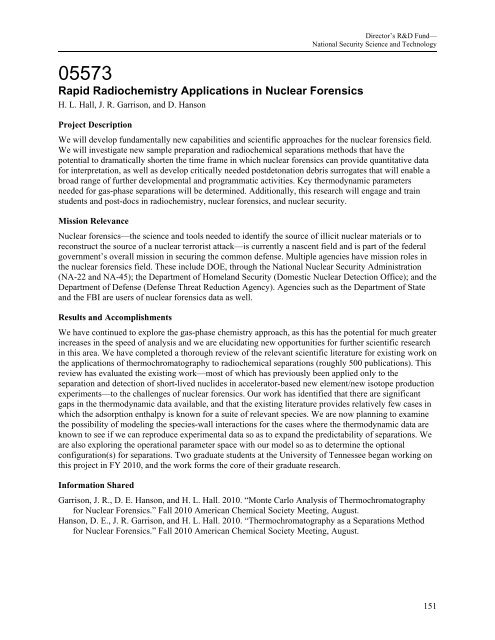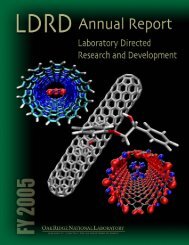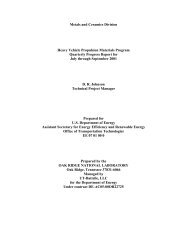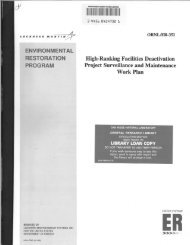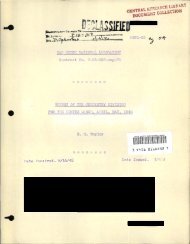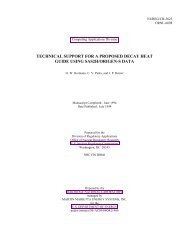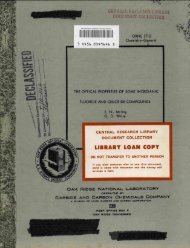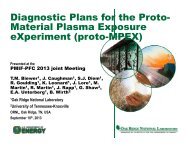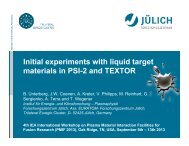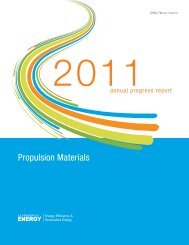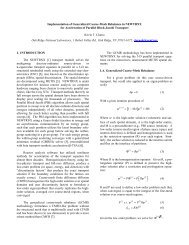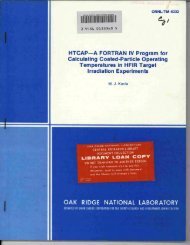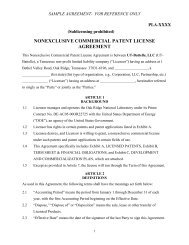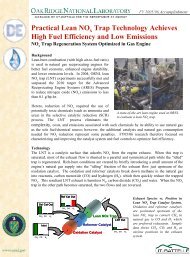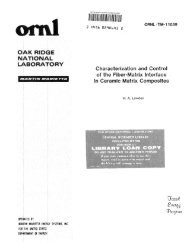FY2010 - Oak Ridge National Laboratory
FY2010 - Oak Ridge National Laboratory
FY2010 - Oak Ridge National Laboratory
You also want an ePaper? Increase the reach of your titles
YUMPU automatically turns print PDFs into web optimized ePapers that Google loves.
05573<br />
Rapid Radiochemistry Applications in Nuclear Forensics<br />
H. L. Hall, J. R. Garrison, and D. Hanson<br />
Director’s R&D Fund—<br />
<strong>National</strong> Security Science and Technology<br />
Project Description<br />
We will develop fundamentally new capabilities and scientific approaches for the nuclear forensics field.<br />
We will investigate new sample preparation and radiochemical separations methods that have the<br />
potential to dramatically shorten the time frame in which nuclear forensics can provide quantitative data<br />
for interpretation, as well as develop critically needed postdetonation debris surrogates that will enable a<br />
broad range of further developmental and programmatic activities. Key thermodynamic parameters<br />
needed for gas-phase separations will be determined. Additionally, this research will engage and train<br />
students and post-docs in radiochemistry, nuclear forensics, and nuclear security.<br />
Mission Relevance<br />
Nuclear forensics—the science and tools needed to identify the source of illicit nuclear materials or to<br />
reconstruct the source of a nuclear terrorist attack—is currently a nascent field and is part of the federal<br />
government’s overall mission in securing the common defense. Multiple agencies have mission roles in<br />
the nuclear forensics field. These include DOE, through the <strong>National</strong> Nuclear Security Administration<br />
(NA-22 and NA-45); the Department of Homeland Security (Domestic Nuclear Detection Office); and the<br />
Department of Defense (Defense Threat Reduction Agency). Agencies such as the Department of State<br />
and the FBI are users of nuclear forensics data as well.<br />
Results and Accomplishments<br />
We have continued to explore the gas-phase chemistry approach, as this has the potential for much greater<br />
increases in the speed of analysis and we are elucidating new opportunities for further scientific research<br />
in this area. We have completed a thorough review of the relevant scientific literature for existing work on<br />
the applications of thermochromatography to radiochemical separations (roughly 500 publications). This<br />
review has evaluated the existing work—most of which has previously been applied only to the<br />
separation and detection of short-lived nuclides in accelerator-based new element/new isotope production<br />
experiments—to the challenges of nuclear forensics. Our work has identified that there are significant<br />
gaps in the thermodynamic data available, and that the existing literature provides relatively few cases in<br />
which the adsorption enthalpy is known for a suite of relevant species. We are now planning to examine<br />
the possibility of modeling the species-wall interactions for the cases where the thermodynamic data are<br />
known to see if we can reproduce experimental data so as to expand the predictability of separations. We<br />
are also exploring the operational parameter space with our model so as to determine the optional<br />
configuration(s) for separations. Two graduate students at the University of Tennessee began working on<br />
this project in FY 2010, and the work forms the core of their graduate research.<br />
Information Shared<br />
Garrison, J. R., D. E. Hanson, and H. L. Hall. 2010. “Monte Carlo Analysis of Thermochromatography<br />
for Nuclear Forensics.” Fall 2010 American Chemical Society Meeting, August.<br />
Hanson, D. E., J. R. Garrison, and H. L. Hall. 2010. “Thermochromatography as a Separations Method<br />
for Nuclear Forensics.” Fall 2010 American Chemical Society Meeting, August.<br />
151


